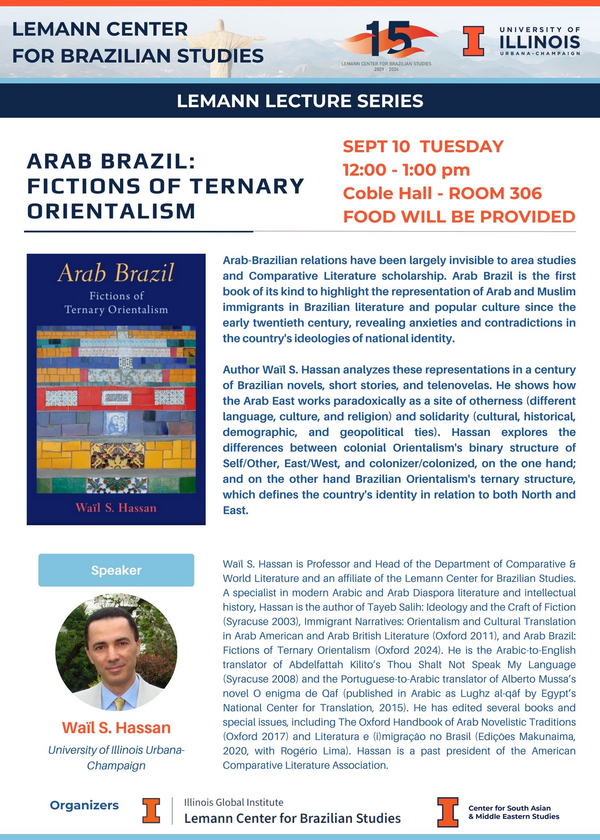Lemann Lecture Series | Wail S. Hassan | Arab Brazil: Fictions of Ternary Orientalism

- Sponsor
- The Lemann Center for Brazilian Studies; Center for South Asian & Middle Eastern Studies
- Speaker
- Waïl S. Hassan is Professor and Head of the Department of Comparative & World Literature and an affiliate of the Lemann Center for Brazilian Studies. A specialist in modern Arabic and Arab Diaspora literature and intellectual history, Hassan is the author of Tayeb Salih: Ideology and the Craft of Fiction (Syracuse 2003), Immigrant Narratives: Orientalism and Cultural Translation in Arab American and Arab British Literature (Oxford 2011), and Arab Brazil: Fictions of Ternary Orientalism (Oxford 2024). He is the Arabic-to-English translator of Abdelfattah Kilito’s Thou Shalt Not Speak My Language (Syracuse 2008) and the Portuguese-to-Arabic translator of Alberto Mussa’s novel O enigma de Qaf (published in Arabic as Lughz al-qāf by Egypt’s National Center for Translation, 2015). He has edited several books and special issues, including The Oxford Handbook of Arab Novelistic Traditions (Oxford 2017) and Literatura e (i)migração no Brasil (Edições Makunaima, 2020, with Rogério Lima). Hassan is a past president of the American Comparative Literature Association.
- Contact
- Lemann Center
- lemann@illinois.edu
- Views
- 99
Arab-Brazilian relations have been largely invisible to area studies and Comparative Literature scholarship. Arab Brazil is the first book of its kind to highlight the representation of Arab and Muslim immigrants in Brazilian literature and popular culture since the early twentieth century, revealing anxieties and contradictions in the country's ideologies of national identity.
Author Waïl S. Hassan analyzes these representations in a century of Brazilian novels, short stories, and telenovelas. He shows how the Arab East works paradoxically as a site of otherness (different language, culture, and religion) and solidarity (cultural, historical, demographic, and geopolitical ties). Hassan explores the differences between colonial Orientalism's binary structure of Self/Other, East/West, and colonizer/colonized, on the one hand; and on the other hand Brazilian Orientalism's ternary structure, which defines the country's identity in relation to both North and East.Food will be provided.